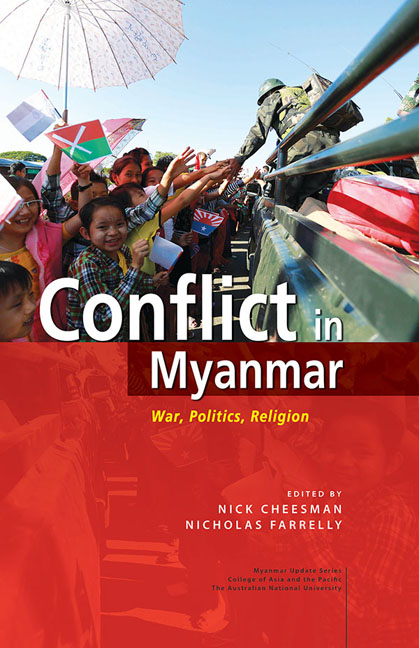Book contents
- Frontmatter
- Contents
- List of Maps
- List of Tables
- List of Figures
- Acknowledgements
- Contributors and Editors
- Part I Introduction
- Part II War and Order
- Part III Elections and After
- 7 The 2015 elections and conflict dynamics in Myanmar
- 8 Institutions in Myanmar's 2015 election: The election commission, international agencies, and the military
- 9 Ethnicity and Buddhist nationalism in the 2015 Rakhine State election results
- 10 The Hluttaw and conflicts in Myanmar
- 11 Legislating reform? Law and conflict in Myanmar
- Part IV Us and Them
- Part V Conclusion
- Abbreviations and Key Terms
- Index
10 - The Hluttaw and conflicts in Myanmar
from Part III - Elections and After
Published online by Cambridge University Press: 22 July 2017
- Frontmatter
- Contents
- List of Maps
- List of Tables
- List of Figures
- Acknowledgements
- Contributors and Editors
- Part I Introduction
- Part II War and Order
- Part III Elections and After
- 7 The 2015 elections and conflict dynamics in Myanmar
- 8 Institutions in Myanmar's 2015 election: The election commission, international agencies, and the military
- 9 Ethnicity and Buddhist nationalism in the 2015 Rakhine State election results
- 10 The Hluttaw and conflicts in Myanmar
- 11 Legislating reform? Law and conflict in Myanmar
- Part IV Us and Them
- Part V Conclusion
- Abbreviations and Key Terms
- Index
Summary
In the five years from when its transition from a military regime began in 2011, Myanmar faced a number of conflicts old and new that had profound influence on the breadth and depth of the transition. The Myitsone dam crisis and subsequent suspension of the project in 2011 changed the way the international community saw the transition (Skidmore and Wilson 2012, p. 7). On the other hand, communal violence in Rakhine State and in several parts of Myanmar in 2012 was portrayed as a setback at a time when reforms were bringing high hopes to the future of Myanmar (Wilson 2014, p. 13). Subsequently, the Letpadaung copper mine dispute and clashes with the police and protesters in 2013; land-grabbing disputes between government agencies, the military, and the local people in 2013; clashes between the Constitutional Tribunal of the Union (CTU) and the legislature on the status of the legislative commissions in 2012; and the student movement on educational bill amendments that turned violent in 2015 were obvious examples of conflicts that have had serious impacts on the course of reforms.
Myanmar's legislature, the Hluttaw, was involved in accommodating these transitional conflicts and its effectiveness and assertiveness were not always the same. For instance, its involvement in the ethnic conflict and the peace negotiations was more ceremonial than crucial (Ei Ei Toe Lwin 2013). Next, the Hluttaw was mostly silent on the communal violence in Rakhine State (Ei Ei Toe Lwin 2014a). While it was less responsive to violent clashes like the Letpadaung copper mine conflict, the legislature was quick to flex its muscles against the CTU when the latter ruled against the legislature (Nardi 2012). Moreover, while the government showed signs of compromise with the students on the amendments to the national education bill, the Hluttaw was firm in its process, and rejected the deadline set by the student movement to amend the law (Htoo Thant and Mratt Kyaw Thu 2015). In land-grabbing disputes, the legislature was proactive and had substantial achievements (Thiri Min Tun 2012).
Each of the conflicts was different in nature and therefore required a different legislative response. Some were long-standing conflicts such as the peace process, while some were new, as in the case of communal violence. Some were fast moving as in the case of Letpadaung copper mine conflict, while some encountered many bureaucratic hurdles as in the case of land grabbing conflicts.
- Type
- Chapter
- Information
- Conflict in MyanmarWar, Politics, Religion, pp. 199 - 220Publisher: ISEAS–Yusof Ishak InstitutePrint publication year: 2016



